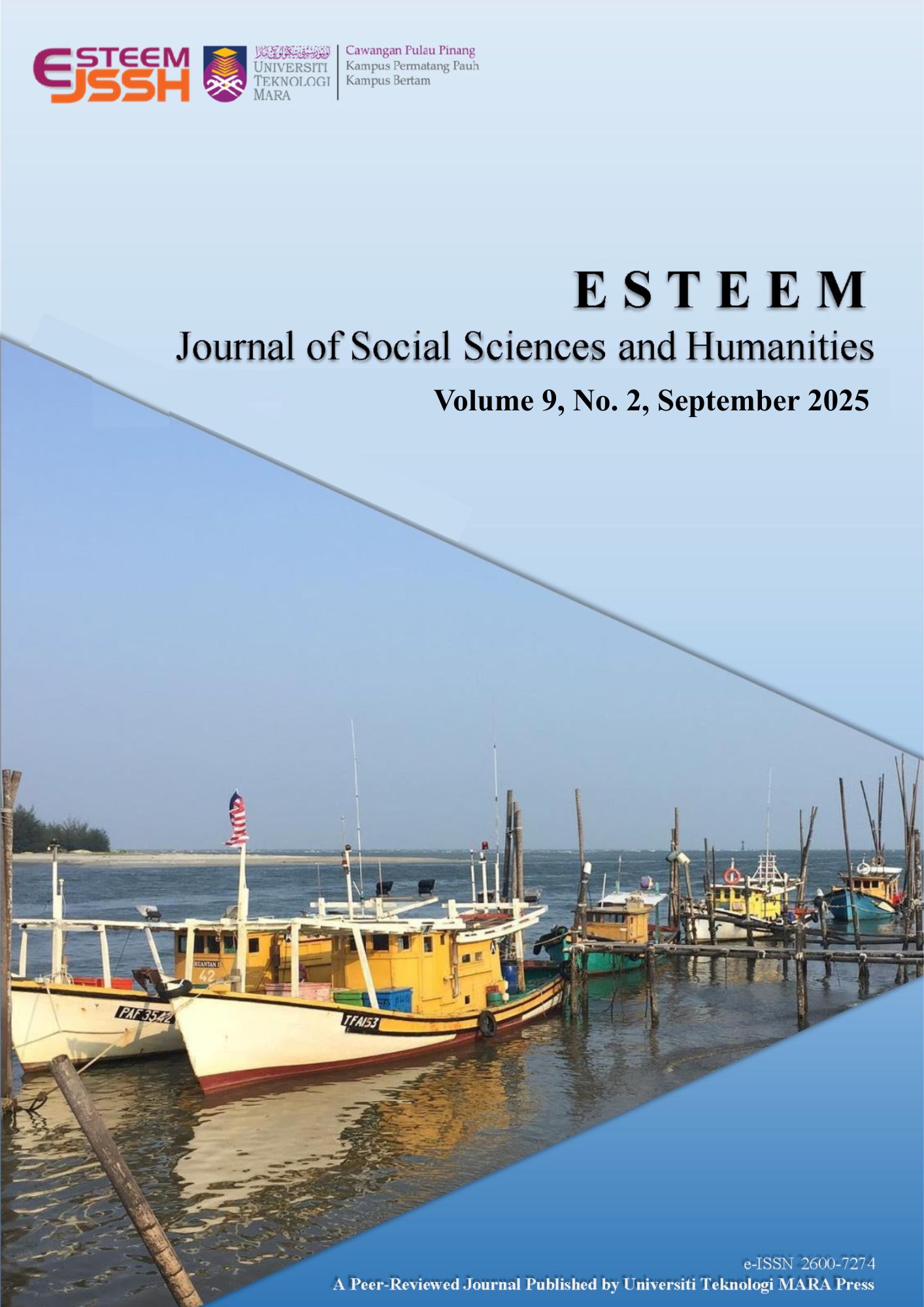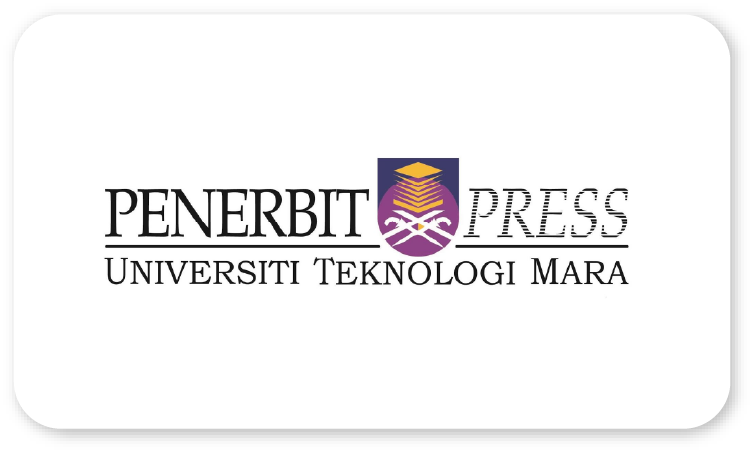
The Relationship Between the Engagement in Meaningful Activities and Health Status Among Elderly in The Community
Nursafia Najwa Rosely
Occupational Therapy Studies, Faculty of Health Sciences, Universiti Teknologi MARA, Selangor Branch Puncak Alam Campus, 42300 Bandar Puncak Alam, Selangor, Malaysia
Akehsan Dahlan
Occupational Therapy Studies, Faculty of Health Sciences, Universiti Teknologi MARA, Selangor Branch Puncak Alam Campus, 42300 Bandar Puncak Alam, Selangor, Malaysia
Abstract
Engagement in meaningful activities is associated with better physical and mental health among elderly individuals in the community. Such participation may delay age-related decline, reduce mortality, and minimise the need for long-term care. This study examined the relationship between engagement in meaningful activities and health status among community-dwelling elderly. A total of 134 participants aged 60 years and above completed the Engagement in Meaningful Activities Survey (EMAS-12) and the Short Form Health Survey (SF-12) using a cross-sectional design. Findings showed a moderate level of engagement, with significant positive correlations for physical health (r = 0.20, p = 0.02) and mental health (r = 0.24, p < 0.01). Group comparisons indicated significant differences in engagement based on education level (F = 11.88, p < 0.001), prior occupation (F = 5.29, p < 0.001), community participation (t = 3.28, p < 0.001), and geographic location (F = 3.67, p = 0.02). Higher engagement was reported among those with tertiary education, professional work backgrounds, active community involvement, and urban residence. In contrast, no significant differences were observed for gender, income, marital status, living arrangement, or ethnicity. Overall, the findings highlight those meaningful activities play a vital role in elderly health, and demographic factors must be considered when designing programmes to promote active ageing and well-being.
Keywords: Elderly, Meaningful activities, Health status, Community-dwellin,g Emas-12, SF-12
DOI:
References:
Awani. (2023, September 20). Malaysian aging society at crossroads. Astroawani.com. https://international.astroawani.com/malaysia-news/columnist-malaysian-aging- society- crossroads-438187
Bone, J. K., Bu, F., Fluharty, M., Paul, E., Sonke, J. K., & Fancourt, D. (2022). Engagement in leisure activities and depression in older adults. The British Journal of Psychiatry, 221(6), 460–466. https://doi.org/10.1192/bjp.2022.21
Brajša-Žganec, A., Merkaš, M., & Šverko, I. (2010). Quality of life and leisure activities: How do leisure activities contribute to subjective well-being? Social Indicators Research, 102(1), 81–91. https://doi.org/10.1007/s11205- 010-9724-5
Brustio, P. R., Liubicich, M. E., Chiabrero, M., & Rabaglietti, E. (2018). Dancing in the golden age: a study on physical function, quality of life, and social engagement. Geriatric Nursing, 39(6), 635–639. https://doi.org/10.1016/j.gerinurse.2018.04.013
Chen, Y.-C., Putnam, M., Lee, Y. S., & Morrow-Howell, N. (2018). Activity Patterns and Health Outcomes in Later Life: The Role of Nature of Engagement. The Gerontologist, 59(4), 698–708. https://doi.org/10.1093/geront/gny023
Costenoble, A., De Baets, S., Knoop, V., Debain, A., & Bautmans, I. (2023). The impact of COVID-19 lockdown on the quality of life and meaningful activities of older adults in Belgium. Aging & Mental Health, 27(8), 1567–1575. https://doi.org/10.1080/13607863.2022.2107406
Dombrowsky, T. A. (2017). Relationship between engagement and level of functional status in older adults. SAGE Open Medicine, 5, 205031211772799. https://doi.org/10.1177/2050312117727998
Elsden, E., Bu, F., Fancourt, D., & Mak, H. W. (2022). Frequency of leisure activity engagement and health functioning over a 4-year period: a population-based study amongst middle-aged adults. BMC Public Health, 22(1), 1275. https://doi.org/10.1186/s12889-022-13670-3
Fancourt, D., Garnett, C., Spiro, N., West, R., & Müllensiefen, D. (2021). How leisure activities affect health: A review of psychological and biological mechanisms. The Lancet Psychiatry, 8(4), 329–339. https://doi.org/10.1016/S2215-0366(20)30384-9
Fernández-Mayoralas, G., Rojo-Pérez, F., Martínez-Martín, P., Prieto-Flores, M.-E., Rodríguez-Blázquez, C., Martín- García, S., & Forjaz, M. J. (2015). Active ageing and quality of life: Factors associated with participation in leisure activities among institutionalized older adults, with and without dementia. Aging & Mental Health, 19(11), 1031–1041. https://doi.org/10.1080/13607863.2014.977768
Haidhir, H. B., & Dahlan, A. B. (2022). Perceived occupational engagement and gaps among community-dwelling older adults in Malaysia. British Journal of Occupational Therapy, 86(1), 030802262211174. https://doi.org/10.1177/03080226221117443
Hatt, C. R. (2022). The Associations among Meaningfulness, Leisure Activity and Cognitive Functioning in Adulthood
- ProQuest. Www.proquest.com. https://www.proquest.com/openview/3b68f07b6fbdfa7b2141f121ba7e73fb/1?pq- origsite=gscholar&cbl=18750&diss=y
Kadariya, S., Gautam, R., & Aro, A. R. (2019). Physical Activity, Mental Health, and Wellbeing among Older Adults in South and Southeast Asia: A Scoping Review. BioMed Research International, 2019, 1–11. https://doi.org/10.1155/2019/6752182
Kim, J., Irwin, L., Kim, M., Chin, S., & Kim, J. (2015). The Role of Leisure Engagement for Health Benefits Among Korean Older Women. Health Care for Women International, 36(12), 1357–1374. https://doi.org/10.1080/07399332.2015.1077843
Lennartsson, C., & Silverstein, M. (2001). Does Engagement With Life Enhance Survival of Elderly People in Sweden? The Role of Social and Leisure Activities. The Journals of Gerontology Series B: Psychological Sciences and Social Sciences, 56(6), S335–S342. https://doi.org/10.1093/geronb/56.6.s335
Lövdén, M., Ghisletta, P., & Lindenberger, U. (2010). Education and cognitive functioning across the life span.
Developmental Psychology, 46(6), 1175–1187. https://doi.org/10.1037/a0020068
Lu, J., Yu, Z., Zhang, X., Wu, M., Lin, S., Zhu, Y., ... & Chen, K. (2020). Association between social health status and health-related quality of life among community-dwelling elderly in Zhejiang. Health and Quality of Life Outcomes, 18(1), 1-8.
Luchesi, B. M., de Brito, T. R. P., Costa, R. S., Tavares, D. M. S., Oliveira, M. A., & Pavarini, S. C. I. (2018). Factors associated with happiness in the elderly persons living in the community. Archives of Gerontology and Geriatrics, 74, 83–87. https://doi.org/10.1016/j.archger.2017.10.006
Maynou, L., Hernández-Pizarro, H. M., & Errea Rodríguez, M. (2021). The Association of Physical (in)Activity with Mental Health. Differences between Elder and Younger Populations: A Systematic Literature Review. International Journal of Environmental Research and Public Health, 18(9), 4771. https://doi.org/10.3390/ijerph18094771
Moen, P. (2001). The gendered life course. In R. H. Binstock & L. K. George (Eds.), Handbook of aging and the social sciences (5th ed., pp. 179–196). Academic Press.
Morley, J. E., Philpot, C. D., Gill, D., & Berg-Weger, M. (2014). Meaningful Activities in the Nursing Home. Journal of the American Medical Directors Association, 15(2), 79–81. doi:10.1016/j.jamda.2013.11.022
Nishino, K., Kotera, S., & Tongtham, A. (2021). Social capital and HRQoL of older adults in Thailand. Universal Journal of Public Health, 9(5), 306–316.
Oh, A., Gan, S., Boscardin, W. J., Allison, T. A., Barnes, D. E., Covinsky, K. E., & Smith, A. K. (2021). Engagement in Meaningful Activities Among Older Adults With Disability, Dementia, and Depression. JAMA Internal Medicine, 181(4). https://doi.org/10.1001/jamainternmed.2020.7492
Parra-Rizo, M. A., & Sanchis-Soler, G. (2020). Satisfaction with life, subjective well-being and functional skills in active older adults based on their level of physical activity practice. International Journal of Environmental Research and Public Health, 17(4), 1299. https://doi.org/10.3390/ijerph17041299
Pinheira, V., Alves, D., & Pires, M. (2018). The Relationship between Mobility, Physical Activity and Strength with Depression, Cognitive State and Health Status in the Elderly in Portugal. The European Journal of Social & Behavioural Sciences, 23(3), 2753–2768. https://doi.org/10.15405/ejsbs.242
Rand, D., Sternberg, S. A., Gasner Winograd, R., Buckman, Z., & Bentur, N. (2022). The Contribution of Frailty to Participation of Older Adults. International Journal of Environmental Research and Public Health, 19(3), 1616. https://doi.org/10.3390/ijerph19031616
Schmelzer, M. M., & Raina, P. (2023). Social connection and meaningful activity among older adults: A systematic review. The Gerontologist. Advance online publication. https://doi.org/10.1093/geront/gnad007
Siddharta, A. (2024, October 2). Malaysia: aging population 2018 | Statista. Statista; Statista. https://www.statista.com/statistics/713529/malaysia-aging-population/
Siu, M., & Lee, D. T. F. (2021). Is Tai Chi an effective intervention for enhancing health‐related quality of life in older people with mild cognitive impairment? An interventional study. International Journal of Older People Nursing. https://doi.org/10.1111/opn.12400
Steptoe, A., & Fancourt, D. (2019). Leading a meaningful life at older ages and its relationship with social engagement, prosperity, health, biology, and time use. Proceedings of the National Academy of Sciences, 116(4), 1207–1212. https://doi.org/10.1073/pnas.1814723116
Tierney, L., & Beattie, E. (2020). Enjoyable, engaging and individualised: A concept analysis of meaningful activity for older adults with dementia. International Journal of Older People Nursing, 15(2). https://doi.org/10.1111/opn.12306
World Health Organization. (2022). Ageing and Health. World Health Organization. https://www.who.int/news- room/fact-sheets/detail/ageing-and-health



